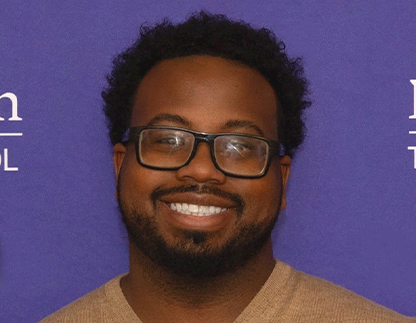Constant evolution is what makes the field so exciting, as there is always something new to learn and fresh perspectives on sustainability to consider.”
Chayse Lavallais
PhD Candidate in Chemical and Biological Engineering

Chayse Lavallais is a PhD candidate in the Department of Chemical and Biological Engineering in the McCormick School of Engineering. He researches ways to recycle nitrogen waste into useful products to help protect the environment. Chayse is a member of the Jennifer Dunn Lab. He was also inducted into the Northwestern chapter of the Edward A. Bouchet Graduate Honor Society in 2024.
How would you describe your research and/or work to a non-academic audience?
My research focuses on the nitrogen circular economy and finding new pathways to make it more sustainable. Specifically, my work involves evaluating emerging technologies that transform waste nitrogen into different high-value products and developing frameworks to assess these technologies against each other. Through this work, I hope to identify potential pathways that can help combat climate change and mitigate other negative environmental impacts.
What have been some of the most memorable twists and turns of your career?
In January 2023, I had the opportunity to participate in a program called PELICANS (Plastic in the Environment: Leaders and Innovators Collaborating from AUS, NZ, and US), which took me to Australia for two weeks! The program focused on developing a deep understanding of the complex and interdependent challenges of designing for sustainability and circularity in polymers and plastics—topics that closely parallel my work on the nitrogen circular economy. The ideas that emerged from this experience, along with the friendships I built along the way, made it truly invaluable!
What do you find both rewarding and challenging about your research and/or work?
The field I work in is constantly evolving! I can read two papers analyzing the same system—one from the start of my PhD and one from now—and find that everything from the methodologies to the conclusions has completely changed. Constant evolution is what makes the field so exciting, as there is always something new to learn and fresh perspectives on sustainability to consider.
Why Northwestern?
I applied to Northwestern because my undergraduate mentor had spent time there during his graduate studies and spoke highly of the community, particularly among students of color. However, once I visited Northwestern and Chicago for the first time, I instantly fell in love with both and knew there was no other place I would rather pursue my PhD.
How do you unwind after a long day?
I’m a big basketball fan, so after a long day, I love going to the gym and playing a few games of pickup. Basketball has always been my way of relaxing and gives me a space to think through any ideas I’m working on. I’ve also met many of my friends on campus through basketball, so it allows me to catch up with them—and maybe talk a little trash if they’re on the other team, haha.
What did you originally want to be when you grew up?
I initially wanted to be a spy—I think I watched too much Spy Kids growing up. As I got older, I realized I didn’t actually want to be a spy, but I wanted to be the person developing all the technology that spies use—like Lucius Fox in the Batman series. I always thought the gadgets in those shows and movies were so cool, and that fascination definitely set me on the path to becoming an engineer.
Tell us about a current achievement or something you're working on that excites you.
Right now, I’m working on designing models to predict the potential impacts of a nitrogen circular economy on a regional or national level. This project is exciting because it allows me to take what I’ve learned from my PhD and propose new ways to make a nitrogen circular economy more feasible. It’s also exciting because I don’t just get to focus on the engineering aspects—I also explore the potential economic implications and the policies that could help incentivize these changes.
Publish Date: April 22, 2025
If you know a graduate student, postdoctoral scholar, graduate faculty member, staff member, or a member of our TGS alumni population who would make a great candidate for our TGS Spotlight Series, please complete this brief TGS Spotlight Series Nomination Form.